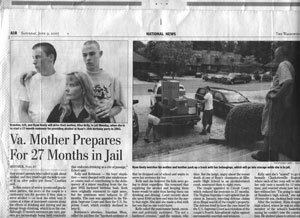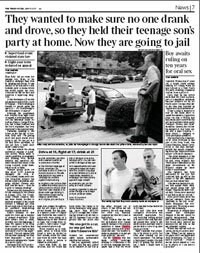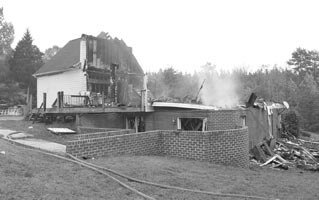COVER- 27 months: Jailing the party parents makes international news
 Paris Hilton's teary return to jail made the front page of the June 9 Washington Post. So did another case involving alcohol and jail, but this story is based in Charlottesville.
Paris Hilton's teary return to jail made the front page of the June 9 Washington Post. So did another case involving alcohol and jail, but this story is based in Charlottesville.
The tale of George Robinson and ex-wife Elisa Kelly's 27-month jail sentence for serving booze to teens is building steam across America, and it has even jumped oceans to England and Australia.
"They wanted to make sure no one drank and drove, so they held their teenage son's party at home. Now they are going to jail," reads a headline in the Times of London June 11– the same day the local duo began serving their sentence at Albemarle-Charlottesville Regional Jail.
"The case," intones the Times, "reflects the strong puritanical impulse of American society, which seeks to restrict gambling, pornography and drinking even though statistics and anecdotal evidence abound that many of the young routinely gorge themselves on all of them."
England's flagship newspaper goes on to note that most Americans can drive by age 15 1/2, can own a firearm at any age, join the Army at age 17, and buy cigarettes at 18. But if they try to have a drink before age 21, gavels and jail doors can swing.
Albemarle Commonwealth's Attorney Jim Camblos says these two parents received the longest such sentence he's seen in this area. He'd requested 90 days in jail, which still, according to the defense attorneys, exceeds county norms.
For example, the Robinsons' eventual sentence nearly matches the 31 months served by Andrew Alston, the UVA student who, in 2003, fatally stabbed a Charlottesville firefighter 18 times and disposed of the weapon. Alston gained his freedom a year ago this month.
Even Camblos was surprised in early 2003, when Judge Dwight Johnson, a jurist whose name had not previously made headlines, invoked the name of a deceased 16-year-old girl and sentenced the Robinsons to eight years each. He had them led away in shackles as a "threat to the community."
They appealed the Juvenile and Domestic Relations Court case to Albemarle Circuit Court, and Judge Paul Peatross reduced the sentence to 27 months, a conviction they contested all the way to the U.S. Supreme Court, which recently declined to hear the case.
Although nobody got killed or injured, and although it was nine times more than he requested, Camblos defends the 27-month sentence.
"It was the worst set of facts I've seen in 15 years," he says of Lisa Kelly buying $340 worth of alcoholic beverages for 15- and 16-year-olds.
"I don't know that it'll stop teenage drinking, but it'll make parents sit up and take notice," says Camblos.
Parents who hosted a party last year and insisted that no alcohol was allowed seemed to have gotten the message– and still ended up raided by police.
On May 28, 2006, a post-prom party for Western Albemarle High students near Crozet enters the halls of local infamy, when police arrest 16 Western Albemarle students– one 17-year-old and fifteen 18-year-olds.
The 5:30am police raid on Hillsboro Lane set off a wave of controversy sparked by allegations that not only were students not intending to drive, but that some students had to be awakened before being arrested.
Later, the school's coaches asked all athletes– in the midst of post-season tournaments– to sign a statement that they had not broken training rules, and about 30 students were dropped from teams, including six starters on the boys' soccer team.
Several parents contacted the Hook to say that Tom and Lucy Goeke, the couple who hosted the Crozet post-prom event, made sure other parents were present for a safe party.
"The real danger is drinking and driving– not drinking," parent Claudia Sencer said at the time.
Two weeks after the party, prosecutor Camblos announced he would not prosecute.
"They were trying to do the right thing," said Camblos, pointing out that the Goekes not only didn't provide alcohol for their under-age attendees, but they also poured out some contraband alcohol and prevented the students from driving.
Another infamous underage local drinking party, held nine days before the Western Albemarle party appeared to directly result in the death of a boy.
The May 19, 2006, party at Bishop Hill Farm had no parents present, according to Camblos. A 17-year-old youth, Nolan Jenkins, left that party and died in what police have called an alcohol-related crash on Route 53.
The key irony in the party at Bishop Hill is that the property is owned by the family of Brittany Hope Bishop. She's the 16-year-old Albemarle High student whose death on July 16, 2002, as a passenger in another./0 alcohol-related accident on Earlysville Road fueled the prosecution of the Robinsons a month later.
In the wake of Brittany's death, her parents established the BRITT program– Beats Risking It, Take a Taxi, a foundation that offers taxi rides to any adolescent who has been drinking. Yet Hook sources claim that no taxis were ordered for the party at the family farm on the day Nolan Jenkins died.
Camblos declined to say what adjudications may have arisen in the Bishop Hill Farm case– only that that the "usual channels" of juvenile justice were utilized.
As for the Goekes who held the non-fatal Crozet party, Camblos told reporters at a year-ago Court Square press conference that he spent a lot of time conferring with police, examining the law, and even debating while commuting to his downtown Charlottesville office with his wife, Christine. "That's what took me so long," Camblos said.
"They were trying to have an alcohol-free party," Camblos said. "They didn't quite get there, but they were trying."
If the Robinsons had their own way of "trying," they may be located in a community not prone to sympathy. Last week, some callers to WINA afternoon radio talk show host Jay James suggested that 27 months wasn't enough. Yet health experts believe a strong message has been sent.
"They're getting as much as Scooter Libby for lying," says Dr. James Turner, executive director of UVA's Student Health Center, noting that Vice President Dick Cheney's former chief of staff got a sentence of 30 months.
Surveys show that high-school age youths typically steal alcohol from their parents, or the parents provide it, says Turner. "Clearly," says Turner, "the high-school student's home is a source of alcohol for partying."
"My gut reaction is [the sentence] is going to have a pretty profound impact on any parent thinking about having a party," says Turner. "Whether it impacts drinking, it's going to cut off one source of supply."
However, as America discovered nearly 100 years ago with Prohibition, colleges hoping to end drinking may fail by imposing strict penalties.
"It doesn't stop the drinking; it pushes it farther out," says Turner, who believes one reason UVA students don't have a lot of DUIs or fatalities is because they live and socialize within walking distance of the university.
Susie Bruce, head of UVA's Center for Alcohol and Substance Education, understands the desire to keep teens from drinking and driving, but if her children were at a party where adults were serving alcohol, "I would be upset as a parent," says Bruce.
"Parents have more influence than they think," says Bruce. "I think students have gotten the message that drinking and driving is bad, but responsible drinking is more than that."
Says Bruce, "I'm aware of no research that parents going to jail is going to affect student drinking."
Many Virginians of a certain age recall that beer was available at age 18, while the District of Columbia allowed all alcohol at that age.
Then came MADD. Mothers Against Drunk Driving, founded by a mom who lost her 13-year-old daughter to a drunk driver, urged legislators to toughen laws. The result was a 1984 law signed by Ronald Reagan that threatened to withhold federal interstate highway funds from any state that declined to raise the drinking age to 21.
While the founder of MADD Candy Lightner, eventually left the organization, branding its course "neoprohibitionist," there has has been little public effort to create a more nuanced set of laws.
Former president of Middlebury College John McCardell wishes there were. Having branded America's insistence on a drinking age of 21 "bad social policy and terrible law," he recently founded a group called Choose Responsibility, and he finds the Robinson case gripping.
"This very sad episode reminds us that current law disenfranchises parents from any role in attempting to create a safe environment," says McCardell. "In this particular case, the parental impulse may have been misguided, but the more general question posed by this incident is whether the law ought properly to displace parental judgment entirely, because any parental role is effectively eliminated by the law until a child turns 21."
The executive director of the Virginia and D.C. branch of Mothers Against Drunk Driving, however, has no such reservations about jailing the Robinsons.
"We think it'll send a clear message that it's unacceptable for adults to provide alcohol to underage folks," says MADD's Chris Konschak. "Setting a 27-month jail sentence does not seem lengthy compared to lives ruined from getting involved in alcohol when they're underage."
He points to statistics showing that the earlier kids use alcohol, the greater the likelihood they're going to have problems with it later in life.
"Our goal is not to put people in jail," Konschak says. "Our goal is that people not provide alcohol to underage folks. If it takes stiffer penalties to do that..."
In Virginia, 322 people were killed in alcohol-related accidents in 2005, he adds.
Fran Lawrence is Elisa Kelly's attorney, and he sees the case as having two prongs. "We thought the sanctity of the home was implicated," he says. Questioning the constitutionality of the police search was the avenue of appeal he used– until denied by the U.S. Supreme Court.
And then there's the duration. While ex-college president McCardell finds "inconsistent enforcement," and so does Lawrence.
"The sentence George and Lisa were given is more than 10 times any sentence ever given for a like event in our court," says Lawrence, who thinks it may be as high as 20 times more.
"Is one standard of a fair sentence what the prosecutor recommends or less?" he asks. Camblos consistently recommended 90 days, and even that, says Lawrence, is three times more than any other sentence he can recall.
In the nearly five years since the ill-fated party, the Robinsons divorced. The party house burned down, and Lisa Kelly told the Daily Progress she's incurred $300,000 in legal expenses. Her life has been put on hold, says her attorney.
According to the Washington Post, her two sons, Brandon Kenty, 16, and Ryan Kenty, 20, are devastated that their mother is going to jail. Ryan, in particular, is wracked by guilt that his 16th birthday party plans went so awry, and he dropped out of Albemarle High where he was a popular athlete.
And Elisa Kelly frets that she'll miss Brandon's final year of high school. The boys will live with their father, Marc Kenty, who served 30 days in jail for icing down the beer and delivering it to the Robinsons' Bleak House Road residence.
Lawrence predicts the jailed individuals will ask for a hearing some time in the future. "They stepped up to the plate and took responsibility," he says. "That ended up burning us every step of the way."
And the impact of sending them to jail for 27 months on teen drinking? "In my experience, increasing the punishment for the crime isn't helpful in deterring the incidence of crime," says Lawrence.
"We're not going to stop trying," says Commonwealth's Attorney Camblos.

Elisa Kelly gives a tearful jailhouse interview to WCAV hours after going in.
PHOTO FROM THE WCAV WEBSITE

George Robinson contemplates what the next two years in jail will be like.
PHOTO BY LUCIE STONE

The Washington Post made the 27-month sentence a national story that has been picked up abroad.
HOOKPHOTO

The Times gave the Robinson jail sentence full-page treatment on page 7– across from a story on the 17-year-old boy who got 10 years for receiving oral sex.
HOOKPHOTO

Scene of the crime: The Bleak House Road abode burned October 18, 2004, and has since been rebuilt.
PHOTO BY JEN FARIELLO
#